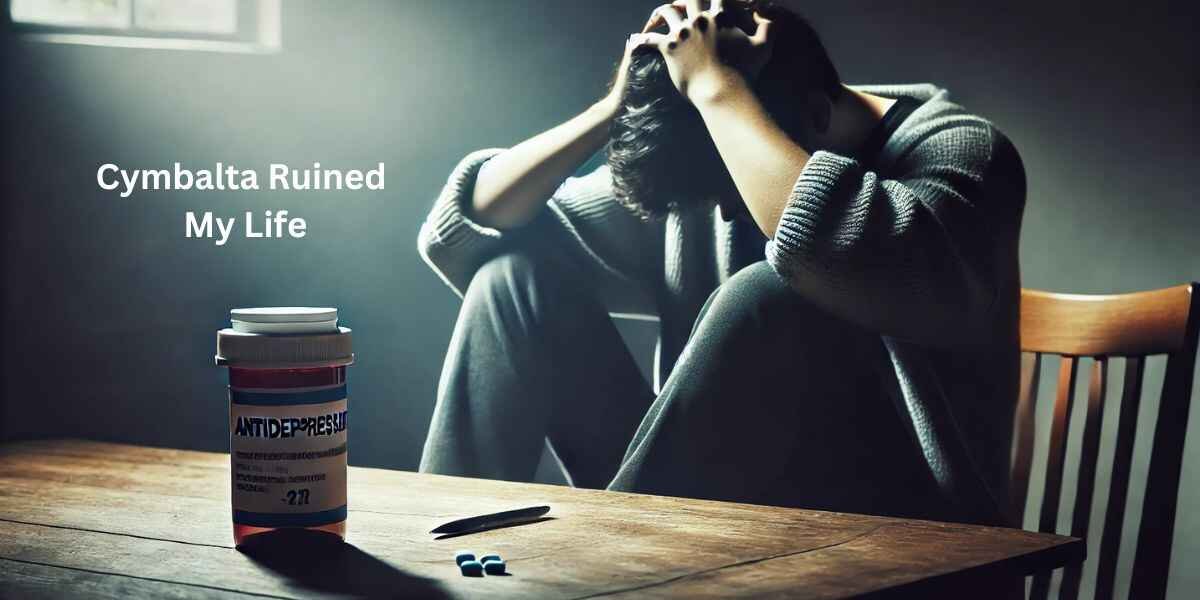Cymbalta Ruined My Life? Discover real struggles, severe side effects, and withdrawal symptoms. Learn safer alternatives and expert tips for recovery.
Introduction: Why People Say “Cymbalta Ruined My Life”
Cymbalta, also known as duloxetine, is a medication prescribed for depression, anxiety, fibromyalgia, and nerve pain. While some find relief, others experience severe side effects. Many people claim, “Cymbalta ruined my life,” due to its adverse effects and withdrawal symptoms. People take Cymbalta hoping to improve their mental and physical health. However, not everyone responds well. Some suffer from insomnia, dizziness, nausea, and mood swings. Others face more serious issues, including suicidal thoughts, hallucinations, and extreme fatigue.
One major concern is dependence. Cymbalta alters brain chemicals, making it hard to stop. Withdrawal can cause severe symptoms, leaving users feeling trapped. Some say they felt worse after stopping Cymbalta than before they started. Before taking Cymbalta, it’s important to understand both benefits and risks. If you or someone you know is struggling, seek medical advice. This article will explore how Cymbalta ruined my life for many people, its side effects, withdrawal symptoms, and safer alternatives.
What Is Cymbalta and How Does It Work?
Cymbalta is a serotonin-norepinephrine reuptake inhibitor (SNRI) used to treat mental health conditions and chronic pain. It works by increasing levels of serotonin and norepinephrine in the brain, which helps regulate mood and reduce pain signals.
How Cymbalta Affects the Brain: Cymbalta boosts serotonin, a neurotransmitter linked to happiness and emotional stability. It also raises norepinephrine levels, which enhances alertness and focus. These changes help people feel more balanced and in control.
How Cymbalta Affects the Body: Beyond mental health, Cymbalta reduces pain perception. It blocks pain signals from reaching the brain, making it useful for conditions like fibromyalgia and diabetic nerve pain. However, this effect can lead to numbness and unusual sensations.
Why Some Say “Cymbalta Ruined My Life”: While Cymbalta helps some, others struggle with severe side effects. Many experience unwanted mood changes, fatigue, and withdrawal issues. Over time, they feel worse than before and regret taking the drug. This is why many claim, “Cymbalta ruined my life.”
Understanding how Cymbalta works is essential before starting treatment. Always discuss risks with a doctor to ensure it is safe for you.
Medical Conditions Treated by Cymbalta
Cymbalta is used to manage several mental and physical health conditions. While some benefit from it, others report serious side effects. Many claim, “Cymbalta ruined my life” due to unexpected health issues.
- Depression and Anxiety Disorders
Cymbalta helps by balancing brain chemicals that affect mood and stress levels. Some people feel relief, but others experience worse depression, mood swings, and emotional numbness.
- Fibromyalgia and Chronic Pain
Doctors also prescribe Cymbalta for fibromyalgia, arthritis, and chronic muscle pain. It blocks pain signals in the nervous system, providing relief. However, some users report feeling disconnected from their bodies, leading to weakness and fatigue.
- Diabetic Neuropathy and Nerve Pain
For those with diabetes, Cymbalta reduces nerve pain caused by high blood sugar levels. It helps by preventing pain signals from reaching the brain. However, many experience dizziness, nausea, and brain fog, making daily activities harder.
While Cymbalta helps many, others struggle with its side effects and withdrawal symptoms. This is why some say, “Cymbalta ruined my life.” Understanding its risks is crucial before starting treatment.
Why Do People Say “Cymbalta Ruined My Life”?
Many people take Cymbalta hoping for relief from depression, anxiety, or chronic pain. However, some experience severe side effects, dependence, and withdrawal symptoms. This leads many to say, “Cymbalta ruined my life.”
- Unwanted Side Effects
Cymbalta can cause insomnia, dizziness, headaches, and nausea. Some people also develop mood swings, emotional numbness, or increased anxiety instead of improvement. These unexpected reactions leave many feeling trapped on the medication.
- Difficult Withdrawal Symptoms
Stopping Cymbalta is challenging. Many people report brain zaps, extreme fatigue, and severe depression when trying to quit. The withdrawal symptoms can last weeks or months, making users feel worse than before.
- Feeling Worse Than Before
Some people say Cymbalta made their original condition even worse. Instead of helping, it led to more mental distress, suicidal thoughts, or constant fatigue. The struggle to regain normal emotions and energy levels causes regret.
For those who say, “Cymbalta ruined my life,” the medication brought more harm than good. Understanding its risks before starting is crucial to making an informed decision. Always talk to a doctor before beginning or stopping Cymbalta.
Common Side Effects of Cymbalta
Many people experience side effects after taking Cymbalta. Some are mild, while others are severe and long-lasting. For some, these effects are so intense that they say, “Cymbalta ruined my life.”
- Physical Side Effects
Cymbalta can cause nausea, dizziness, dry mouth, and headaches. Some users feel extremely tired or weak. Others notice weight gain or loss, depending on how the drug affects their metabolism. Excessive sweating is another common complaint.
- Mental and Emotional Side Effects
Instead of improving mood, Cymbalta can sometimes make people feel numb or detached. Some experience increased anxiety, panic attacks, or emotional instability. Others report feeling more irritable or angry than before.
- Sexual Side Effects
Cymbalta can reduce libido and sexual performance in both men and women. Many struggle with lack of interest, difficulty achieving arousal, or other dysfunctions. This can impact relationships and self-esteem.
While some tolerate Cymbalta well, others experience severe and lasting effects. Many regret starting it and struggle to quit. This is why many claim, “Cymbalta ruined my life.” It is important to weigh the risks before taking this medication.
Severe Side Effects That Make People Say “Cymbalta Ruined My Life”
While some people experience mild symptoms, others suffer from serious health problems due to Cymbalta. These severe side effects can make people say, “Cymbalta ruined my life.”
- Mental Health Complications: Some people report increased depression, anxiety, and even suicidal thoughts after starting Cymbalta. Instead of stabilizing emotions, the drug may cause mood swings, paranoia, or emotional numbness. In rare cases, it leads to hallucinations and confusion.
- Physical Health Risks: Cymbalta can cause high blood pressure, irregular heartbeat, and severe dizziness. Some people develop liver problems, leading to yellowing of the skin and eyes. Others experience internal bleeding, which can show up as blood in urine or stool.
- Severe Allergic Reactions: Some users have life-threatening allergic reactions, including swelling of the face, difficulty breathing, and skin rashes. In extreme cases, Cymbalta can cause fainting and unconsciousness.
These serious side effects leave many struggling with permanent health problems. Some feel worse than before they started the medication. This is why so many claim, “Cymbalta ruined my life.” Before taking it, consider the risks and consult a doctor.
Also Read: Reddit Soccer Streams: Best & Worst Free Football Option
How Cymbalta Affects Mental Health
Cymbalta is meant to stabilize mood and reduce anxiety, but for some, it worsens mental health. Many people claim, “Cymbalta ruined my life,” due to unexpected emotional changes.
- Emotional Numbness: Instead of feeling better, some users report emotional detachment. This makes relationships and daily life feel dull and unfulfilling.
- Increased Anxiety and Panic Attacks: While Cymbalta is prescribed for anxiety, some people experience worse symptoms. Many report panic attacks, racing thoughts, and overwhelming fear after starting the medication.
- Suicidal Thoughts and Depression: In rare cases, Cymbalta can cause suicidal thoughts, especially in young adults. Instead of improving depression, it can worsen it. Some users feel hopeless, trapped, and emotionally unstable.
- Cognitive Issues: Some people notice brain fog, memory problems, and difficulty focusing. They struggle with clear thinking and decision-making, which affects work and daily activities.
For those who say, “Cymbalta ruined my life,” the drug made their mental health worse instead of better. Before taking Cymbalta, it is essential to understand the risks and discuss alternatives with a doctor.
Physical Health Issues Linked to Cymbalta
Cymbalta affects not only the mind but also the body. Many users experience physical health problems that make them say, “Cymbalta ruined my life.”
- Nervous System Issues
Cymbalta changes how the nervous system works. Some people feel tingling, numbness, or electric shock sensations, often called “brain zaps.” These symptoms can be uncomfortable and frightening.
- Heart and Blood Pressure Problems
Some users report high blood pressure, irregular heartbeats, and dizziness. Cymbalta can make people feel lightheaded or cause them to faint unexpectedly.
- Severe Muscle Weakness and Pain
Cymbalta is prescribed for chronic pain, but some people experience increased muscle pain and weakness. Some report feeling too weak to perform daily tasks, making them dependent on others for help.
- Digestive Problems
Cymbalta can cause nausea, vomiting, constipation, or diarrhea. Some people develop severe stomach pain or notice blood in their stool, which could indicate internal bleeding.
For those who claim, “Cymbalta ruined my life,” these physical issues disrupt their daily routines. Before taking Cymbalta, it is important to understand the risks and monitor side effects closely.

Struggles of Quitting Cymbalta: Why People Feel “Cymbalta Ruined My Life”
Many people struggle to quit Cymbalta because of its intense withdrawal symptoms. Some say, “Cymbalta ruined my life,” because stopping it feels even worse than taking it.
- Why Cymbalta Is Hard to Quit: Cymbalta changes brain chemistry by increasing serotonin and norepinephrine levels. When the drug is stopped, these levels drop suddenly, causing severe mental and physical symptoms. The body needs time to adjust, but the process can be painful and frustrating.
- Rebound Depression and Anxiety: Some people experience worse depression and anxiety after quitting. They feel hopeless, irritable, or overwhelmed, making daily life difficult. This rebound effect can last weeks or even months.
- Severe Withdrawal Symptoms: Withdrawal from Cymbalta can cause dizziness, nausea, sweating, and “brain zaps.” Some people experience extreme fatigue, confusion, and muscle pain. These symptoms make it hard to function normally.
- Feeling Trapped on the Medication: Because withdrawal is so difficult, some people stay on Cymbalta even if they don’t want to. They fear quitting will make them feel worse, leaving them stuck.
For those who say, “Cymbalta ruined my life,” withdrawal is one of the biggest reasons. A doctor-supervised tapering plan is the safest way to quit.
Common Cymbalta Withdrawal Symptoms
Many people who stop taking Cymbalta experience severe withdrawal symptoms. These effects can last weeks or even months, making them feel, “Cymbalta ruined my life.”
1. Mental and Emotional Symptoms
Stopping Cymbalta can cause severe mood swings, anxiety, and depression. Some people feel irritable, angry, or emotionally unstable. Nightmares and vivid dreams are also common.
2. Physical Symptoms
Cymbalta can also cause dizziness, nausea, and flu-like symptoms. Some people experience intense fatigue and muscle pain, making it hard to move or work.
3. Brain Zaps and Neurological Effects
One of the most disturbing symptoms is brain zaps—a sudden electric shock sensation in the head. Others feel vertigo, confusion, or memory problems.
4. Sleep Disturbances
Many people have insomnia or restless sleep after stopping Cymbalta. Some experience night terrors and wake up feeling exhausted.
These withdrawal effects make quitting Cymbalta a difficult process. Many people feel worse after stopping, which is why they say, “Cymbalta ruined my life.” A slow tapering process under medical guidance can help manage symptoms.
Is Cymbalta Addictive?
Cymbalta is not classified as an addictive drug, but many people still develop a dependence on it. This leads some to say, “Cymbalta ruined my life.”
1. Understanding Dependence vs. Addiction
Addiction means craving a drug for pleasure, while dependence means needing it to function normally. Cymbalta does not cause a “high,” but many users struggle to stop taking it due to severe withdrawal symptoms.
2. Why People Become Dependent on Cymbalta
Over time, Cymbalta changes brain chemistry. The body relies on it to maintain stable serotonin and norepinephrine levels. When people try to quit, their mood crashes, anxiety increases, and withdrawal symptoms appear.
3. Signs of Cymbalta Dependence
- Feeling unable to function without Cymbalta
- Experiencing severe withdrawal symptoms when skipping a dose
- Fear of quitting due to withdrawal
Many users feel stuck on Cymbalta. They never intended to depend on it but now cannot stop without suffering. This is why so many say, “Cymbalta ruined my life.” A careful tapering plan is needed to quit safely.
How to Safely Stop Using Cymbalta
Quitting Cymbalta suddenly can lead to severe withdrawal symptoms. Many people say, “Cymbalta ruined my life” because they stopped without a proper plan. A safe tapering process is essential to reduce risks.
1. Doctor-Supervised Tapering
The best way to quit Cymbalta is under a doctor’s supervision. A slow dose reduction allows the body to adjust. Doctors may recommend reducing the dosage over weeks or months to prevent withdrawal effects.
2. Managing Withdrawal Effects
Even with tapering, some withdrawal symptoms may appear. To manage them:
- Stay Hydrated: Drink plenty of water to reduce dizziness and nausea.
- Exercise Gently: Light physical activity can help with fatigue and mood swings.
- Sleep Well: Rest is essential to help the body recover.
- Eat Healthy: A balanced diet supports brain and nerve function.
3. When to Seek Medical Help
If withdrawal symptoms become unbearable, consult a doctor. Severe depression, suicidal thoughts, or extreme dizziness may require medical intervention.
For those who say, “Cymbalta ruined my life,” a slow and safe tapering process can make quitting easier. Always consult a healthcare provider before stopping Cymbalta.
How to Recover After Saying “Cymbalta Ruined My Life”
Many people struggle with the effects of Cymbalta, even after stopping it. They experience long-term physical and mental health issues. Recovery takes time, but it is possible with the right approach.
Therapy and Counseling
Professional therapy can help manage emotional distress after quitting Cymbalta. Cognitive Behavioral Therapy (CBT) is useful for anxiety, depression, and mood swings. A therapist can guide individuals in rebuilding their mental health.
Lifestyle Changes for Recovery
- Regular Exercise: Physical activity boosts serotonin and reduces stress.
- Balanced Diet: Eating nutrient-rich foods supports brain and nerve health.
- Mindfulness and Meditation: Deep breathing and relaxation techniques help control anxiety.
- Social Support: Talking to family, friends, or support groups reduces feelings of isolation.
Support Groups and Online Communities
Many people share their struggles with Cymbalta in online forums and local support groups. Connecting with others who have faced similar challenges can provide comfort and guidance.
Recovery is not instant, but with the right steps, it is achievable. Many who once said, “Cymbalta ruined my life,” have found ways to heal and move forward. Seeking support and making lifestyle adjustments are key to regaining well-being.

Alternative Treatments for Conditions Cymbalta Treats
Many people regret taking Cymbalta due to its side effects and withdrawal struggles. After saying, “Cymbalta ruined my life,” they look for safer alternatives. There are different treatments for depression, anxiety, and chronic pain that do not involve Cymbalta.
Natural Remedies
- Exercise: Regular physical activity helps boost mood and reduce stress.
- Herbal Supplements: Some people find relief with St. John’s Wort, ashwagandha, or magnesium.
- Healthy Diet: A diet rich in omega-3 fatty acids, vitamins, and antioxidants supports mental health.
Other Medications
For those who need medication, there are alternatives to Cymbalta:
- Other SNRIs or SSRIs: Doctors may prescribe different antidepressants with fewer side effects.
- Gabapentin or Pregabalin: These are used for nerve pain and fibromyalgia.
- Tricyclic Antidepressants (TCAs): Some people respond better to older antidepressants like amitriptyline.
Therapy and Holistic Approaches
- Cognitive Behavioral Therapy (CBT): Helps manage negative thoughts and emotions.
- Acupuncture and Yoga: Alternative therapies can provide relaxation and pain relief.
For those who believe, “Cymbalta ruined my life,” exploring these alternatives can offer hope. A doctor can help find the best treatment plan without severe side effects.
Conclusion: Should You Take Cymbalta?
Cymbalta can help some people manage depression, anxiety, and chronic pain, but for others, it causes severe side effects and withdrawal struggles. Many who say, “Cymbalta ruined my life,” regret taking it due to emotional numbness, dependence, and health complications. Before starting this medication, it’s crucial to understand both the benefits and risks. Always consult a doctor, explore alternative treatments, and consider long-term effects. If you are already taking Cymbalta and struggling, seek professional guidance for a safe way to manage symptoms or taper off.






